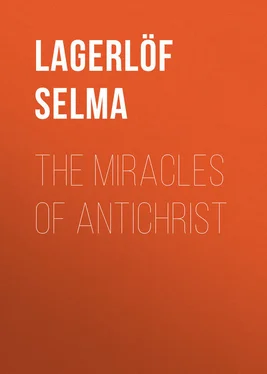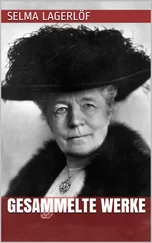Selma Lagerlöf - The Miracles of Antichrist
Здесь есть возможность читать онлайн «Selma Lagerlöf - The Miracles of Antichrist» — ознакомительный отрывок электронной книги совершенно бесплатно, а после прочтения отрывка купить полную версию. В некоторых случаях можно слушать аудио, скачать через торрент в формате fb2 и присутствует краткое содержание. Жанр: foreign_antique, foreign_prose, на английском языке. Описание произведения, (предисловие) а так же отзывы посетителей доступны на портале библиотеки ЛибКат.
- Название:The Miracles of Antichrist
- Автор:
- Жанр:
- Год:неизвестен
- ISBN:нет данных
- Рейтинг книги:4 / 5. Голосов: 1
-
Избранное:Добавить в избранное
- Отзывы:
-
Ваша оценка:
- 80
- 1
- 2
- 3
- 4
- 5
The Miracles of Antichrist: краткое содержание, описание и аннотация
Предлагаем к чтению аннотацию, описание, краткое содержание или предисловие (зависит от того, что написал сам автор книги «The Miracles of Antichrist»). Если вы не нашли необходимую информацию о книге — напишите в комментариях, мы постараемся отыскать её.
The Miracles of Antichrist — читать онлайн ознакомительный отрывок
Ниже представлен текст книги, разбитый по страницам. Система сохранения места последней прочитанной страницы, позволяет с удобством читать онлайн бесплатно книгу «The Miracles of Antichrist», без необходимости каждый раз заново искать на чём Вы остановились. Поставьте закладку, и сможете в любой момент перейти на страницу, на которой закончили чтение.
Интервал:
Закладка:
Alas, alas! the whole market-place had been so full of gayety! The peasants, who were at home over Sunday, had stood there in great crowds in holiday dress, with red shawls wound round their necks. The peasant women on their way to the cathedral had glided by, dressed in green skirts and yellow neckerchiefs. A couple of travellers had stood by the balustrade and looked at Etna; they had been dressed in white. And all the musicians in uniform, who had been almost as fine as Don Ferrante, and the shining instruments, and the carved cathedral façade ! And the sunlight, and Mongibello’s snow top – so near to-day that one could almost touch it – had all been so gay.
Now, when the poor black lady came into the midst of it all, they had stared at her, and some had made the sign of the cross. And the children had rushed down from the steps of the town-hall, where they were riding on the railing, and had followed her at a few feet’s distance. And even the lazy Piero, who had been asleep in the corner of the balustrade, had raised himself on his elbow. It had been a resurrection, as if the black Madonna from the cathedral had come strolling by.
But had no one thought that it was unkind that all stared at the black lady? Had no one been moved when she came so slowly and painfully?
Yes, yes; one had been touched, and that had been Don Ferrante. He had the music in his heart; he was a good man and he thought: “Curses on all those funds that are gathered together for the poor, and that only bring people misfortune! Is not that poor Signorina Palmeri, whose father has stolen from a charitable fund, and who is now so ashamed that she dares not show her face?” And, as he thought of it, Don Ferrante went towards the black lady and met her just by the church door.
There he made her a bow, and mentioned his name. “If I am not mistaken,” Don Ferrante had said, “you are Signorina Palmeri. I have a favor to ask of you.”
Then she had started and taken a step backwards, as if to flee, but she had waited.
“It concerns my sister, Donna Elisa,” he had said. “She knew your mother, signorina, and she is consumed with a desire to make your acquaintance. She is sitting here by the Cathedral. Let me take you to her!”
And then Don Ferrante put her hand on his arm and led her over to Donna Elisa. And she made no resistance. Donna Elisa would like to see who could have resisted Don Ferrante to-day.
Donna Elisa rose and went to meet the black lady, and throwing back her veil, kissed her on both cheeks.
But what a face, what a face! Perhaps it was not pretty, but it had eyes that spoke, eyes that mourned and lamented, even when the whole face smiled. Yes, Gaetano perhaps would not wish to carve or paint a Madonna from that face, for it was too thin and too pale; but it is to be supposed that our Lord knew what he was doing when he did not put those eyes in a face that was rosy and round.
When Donna Elisa kissed her, she laid her head down on her shoulder, and a few short sobs shook her. Then she looked up with a smile, and the smile seemed to say: “Ah, does the world look so? Is it so beautiful? Let me see it and smile at it! Can a poor unfortunate really dare to look at it? And to be seen? Can I bear to be seen?”
All that she had said without a word, only with a smile. What a face, what a face!
But here Gaetano interrupted Donna Elisa. “Where is she now?” he said. “I too must see her.”
Then Donna Elisa looked Gaetano in the eyes. They were glowing and clear, as if they were filled with fire, and a dark flush rose to his temples.
“You will see her all in good time,” she said, harshly. And she repented of every word she had said.
Gaetano saw that she was afraid, and he understood what she feared. It came into his mind to tell her now that he meant to go away, to go all the way to America.
Then he understood that the strange signorina must be very dangerous. Donna Elisa was so sure that Gaetano would fall in love with her that she was almost glad to hear that he meant to go away.
For anything seemed better to her than a penniless daughter-in-law, whose father was a thief.
VI
DON MATTEO’S MISSION
One afternoon the old priest, Don Matteo, inserted his feet into newly polished shoes, put on a newly brushed soutane, and laid his cloak in the most effective folds. His face shone as he went up the street, and when he distributed blessings to the old women spinning by the doorposts, it was with gestures as graceful as if he had scattered roses.
The street along which Don Matteo was walking was spanned by at least seven arches, as if every house wished to bind itself to a neighbor. It ran small and narrow down the mountain; it was half street and half staircase; the gutters were always overflowing, and there were always plenty of orange-skins and cabbage-leaves to slip on. Clothes hung on the line, from the ground up to the sky. Wet shirt-sleeves and apron-strings were carried by the wind right into Don Matteo’s face. And it felt horrid and wet, as if Don Matteo had been touched by a corpse.
At the end of the street lay a little dark square, and there Don Matteo saw an old house, before which he stopped. It was big, and square, and almost without windows. It had two enormous flights of steps, and two big doors with heavy locks. And it had walls of black lava, and a “loggia,” where green slime grew over the tiled floor, and where the spider-webs were so thick that the nimble lizards were almost held fast in them.
Don Matteo lifted the knocker, and knocked till it thundered. All the women in the street began to talk, and to question. All the washerwomen by the fountain in the square dropped soap and wooden clapper, and began to whisper, and ask, “What is Don Matteo’s errand? Why does Don Matteo knock on the door of an old, haunted house, where nobody dares to live except the strange signorina, whose father is in prison?”
But now Giannita opened the door for Don Matteo, and conducted him through long passages, smelling of mould and damp. In several places in the floor the stones were loose, and Don Matteo could see way down into the cellar, where great armies of rats raced over the black earth floor.
As Don Matteo walked through the old house, he lost his good-humor. He did not pass by a stairway without suspiciously spying up it, and he could not hear a rustle without starting. He was depressed as before some misfortune. Don Matteo thought of the little turbaned Moor who was said to show himself in that house, and even if he did not see him, he might be said to have felt him.
At last Giannita opened a door and showed the priest into a room. The walls there were bare, as in a stable; the bed was as narrow as a nun’s, and over it hung a Madonna that was not worth three soldi. The priest stood and stared at the little Madonna till the tears rose to his eyes.
While he stood so Signorina Palmeri came into the room. She kept her head bent and moved slowly, as if wounded. When the priest saw her he wished to say to her: “You and I, Signorina Palmeri, have met in a strange old house. Are you here to study the old Moorish inscriptions or to look for mosaics in the cellar?” For the old priest was confounded when he saw Signorina Palmeri. He could not understand that the noble lady was poor. He could not comprehend that she was living in the house of the little Moor.
He said to himself that he must save her from this haunted house, and from poverty. He prayed to the tender Madonna for power to save her.
Thereupon he said to the signorina that he had come with a commission from Don Ferrante Alagona. Don Ferrante had confided to him that she had refused his proposal of marriage. Why was that? Did she not know that, although Don Ferrante seemed to be poor as he stood in his shop, he was really the richest man in Diamante? And Don Ferrante was of an old Spanish family of great consideration, both in their native country and in Sicily. And he still owned the big house on the Corso that had belonged to his ancestors. She should not have said no to him.
Читать дальшеИнтервал:
Закладка:
Похожие книги на «The Miracles of Antichrist»
Представляем Вашему вниманию похожие книги на «The Miracles of Antichrist» списком для выбора. Мы отобрали схожую по названию и смыслу литературу в надежде предоставить читателям больше вариантов отыскать новые, интересные, ещё непрочитанные произведения.
Обсуждение, отзывы о книге «The Miracles of Antichrist» и просто собственные мнения читателей. Оставьте ваши комментарии, напишите, что Вы думаете о произведении, его смысле или главных героях. Укажите что конкретно понравилось, а что нет, и почему Вы так считаете.












